- Home
- Jennifer Donnelly
These Shallow Graves
These Shallow Graves Read online
Dear Reader,
If you’re already a fan of Jennifer Donnelly, I assure you, her new novel will not disappoint. If you’re just discovering her, you’re in for a treat.
These Shallow Graves introduces Josephine Montfort, a girl whose future was set the day she was born. The trouble is, hers is not a future she particularly wants. In 1890, what a woman could do, how she should behave, and who she could associate with was, in most cases, determined by the social standing of her family. Jo is one of the lucky ones. Her life is one of wealth and status, and feels wide open. Yet these very blessings are what confine her. In Jo’s time, the lives of girls and women weren’t about following dreams. Boys could be and do anything; girls had rules to follow. The double standard between the sexes was enormous, and sadly, it’s still alive and well today, which is why These Shallow Graves resonates so deeply. I’ve never met a girl who likes to follow rules.
Jennifer Donnelly isn’t one to shy away from complex subjects. On the surface, These Shallow Graves is an electrifying crime novel. But as always, Donnelly digs deeper, asking hard questions. What does it mean to be a girl and to have dreams? What does it mean to follow your heart despite the certainty that you will lose all that you know? These questions are what propel Jo into the dark world of death, violence, secrets, and revenge that permeate this mystery. An average girl would run. Lucky for us, Josephine Montfort is not an average girl.
I am thrilled to share Jo’s story with you. It’s dark and haunting, and so memorable. I’m sure it will stay with you long after you’ve turned the last page.
Best,
Krista Marino
Executive Editor, Delacorte Press
Also by Jennifer Donnelly
Revolution
A Northern Light
This is an uncorrected eBook file. Please do not quote for publication until you check your copy against the finished book.
This is a work of fiction. All incidents and dialogue, and all characters with the exception of some well-known historical and public figures, are products of the author’s imagination and are not to be construed as real. Where real-life historical or public figures appear, the situations, incidents, and dialogues concerning those persons are fictional and are not intended to depict actual events or to change the fictional nature of the work. In all other respects, any resemblance to persons living or dead is entirely coincidental.
Text copyright © 2015 by Jennifer Donnelly
Jacket art copyright © 2015
All rights reserved. Published in the United States by Delacorte Press, an imprint of Random House Children’s Books, a division of Penguin Random House LLC, New York.
Delacorte Press is a registered trademark and the colophon is a trademark of Penguin Random House LLC.
Visit us on the Web! randomhouseteens.com
Educators and librarians, for a variety of teaching tools, visit us at RHTeachersLibrarians.com
Library of Congress Cataloging-in-Publication Data
Donnelly, Jennifer.
These shallow graves / Jennifer Donnelly. — First edition.
pages cm
Summary: A young woman in nineteenth-century New York City must struggle against gender and class boundaries when her father is found dead of a supposed suicide, and she believes there is more than meets the eye, so in order to uncover the truth she will have to decide how much she is willing to risk and lose.
ISBN 978-0-385-73765-4 (hc) — ISBN 978-0-307-98291-9 (el) —
ISBN 978-0-385-90679-1 (glb) — ISBN 978-1-101-93126-4 (intl. tr. pbk.)
[1. Death—Fiction. 2. Fathers and daughters—Fiction. 3. Sex role—Fiction. 4. Social classes—Fiction. 5. New York (N.Y.)—History—19th century—Fiction.] I. Title.
PZ7.D7194Th 2015
[Fic]—dc23
2014047825
Printed in the United States of America
10 9 8 7 6 5 4 3 2 1
First Edition
Random House Children’s Books supports the First Amendment and celebrates the right to read.
Contents
Cover
National Marketing and Publicity Campaign
Letter to Reader
eBook Information
By Jennifer Donnelly
Title page
Copyright page
Dedication
Darkbriar Asylum for the Insane, New York City
November 29, 1890
ONE
TWO
THREE
FOUR
FIVE
SIX
SEVEN
EIGHT
NINE
TEN
ELEVEN
TWELVE
THIRTEEN
FOURTEEN
FIFTEEN
SIXTEEN
SEVENTEEN
EIGHTEEN
NINETEEN
TWENTY
TWENTY-ONE
TWENTY-TWO
TWENTY-THREE
TWENTY-FOUR
TWENTY-FIVE
TWENTY-SIX
TWENTY-SEVEN
TWENTY-EIGHT
TWENTY-NINE
THIRTY
THIRTY-ONE
THIRTY-TWO
THIRTY-THREE
THIRTY-FOUR
THIRTY-FIVE
THIRTY-SIX
THIRTY-SEVEN
THIRTY-EIGHT
THIRTY-NINE
FORTY
FORTY-ONE
FORTY-TWO
FORTY-THREE
FORTY-FOUR
FORTY-FIVE
FORTY-SIX
FORTY-SEVEN
FORTY-EIGHT
FORTY-NINE
FIFTY
FIFTY-ONE
FIFTY-TWO
FIFTY-THREE
FIFTY-FOUR
FIFTY-FIVE
FIFTY-SIX
FIFTY-SEVEN
FIFTY-EIGHT
FIFTY-NINE
SIXTY
SIXTY-ONE
SIXTY-TWO
SIXTY-THREE
SIXTY-FOUR
SIXTY-FIVE
SIXTY-SIX
SIXTY-SEVEN
SIXTY-EIGHT
SIXTY-NINE
SEVENTY
SEVENTY-ONE
SEVENTY-TWO
SEVENTY-THREE
SEVENTY-FOUR
SEVENTY-FIVE
SEVENTY-SIX
SEVENTY-SEVEN
SEVENTY-EIGHT
SEVENTY-NINE
EIGHTY
EIGHTY-ONE
EIGHTY-TWO
EIGHTY-THREE
EIGHTY-FOUR
EIGHTY-FIVE
EIGHTY-SIX
EIGHTY-SEVEN
EIGHTY-EIGHT
EIGHTY-NINE
NINETY
NINETY-ONE
NINETY-TWO
NINETY-THREE
NINETY-FOUR
NINETY-FIVE
NINETY-SIX
NINETY-SEVEN
NINETY-EIGHT
NINETY-NINE
ONE HUNDRED
Epilogue
Darkbriar Asylum for the Insane
New York City
November 29, 1890
Josephine Montfort stared at the newly mounded grave in front of her and at the wooden cross marking it.
“This is the one you’re after. Kinch,” Flynn, the gravedigger, said, pointing at the name painted on the cross. “He died on Tuesday.”
Tuesday, Jo thought. Four days ago. Time enough for the rot to start. And the stink.
“I’ll be wanting my money now,” Flynn said.
Jo put her lantern down. She fumbled notes out of her coat pocket and counted them into Flynn�
��s hand.
“You get caught out here, you never saw me. You hear, girl?”
Jo nodded. Flynn pocketed his money and walked off into the darkness. Moonlight spilled over the rows of graves and over the looming towers of the asylum. A wail rose on the night, thin and chilling.
And suddenly Jo’s courage failed her.
“Step aside, Jo. We’ll do it. Oscar and me,” Eddie said.
He was standing across from her, on the other side of the grave. He said nothing more as she met his gaze. He didn’t have to. The challenge in his eyes spoke volumes.
How did this happen? How did I get here? Jo asked herself. She didn’t want to do this. She wanted to be home. Safe inside her Gramercy Square brownstone. She wished she’d never met Eddie Gallagher. The Tailor. Madam Esther. Fairy Fay. Most of all, she wished she’d never laid eyes on the man buried six feet below her.
“Wait by the vault. Go back,” Eddie said. Not unkindly.
Jo laughed. Go back? How? There was no going back. Not to her old life of drawing rooms and dances. Not to Miss Sparkwell’s School. Not to her friends, or to Bram. It had all gone too far.
“Jo …”
“You wait by the vault, Eddie,” Jo said crisply.
Eddie snorted. He tossed a shovel at her. Jo flinched as she caught it, then started to dig.
Miss Sparkwell’s School for Young Ladies
Farmington, Connecticut
September 17, 1890
“Trudy, be a dear and read these stories for me,” said Jo Montfort, laying out articles for her school’s newspaper on a tea table. “I can’t abide errors.”
Gertrude Van Eyck, all blond curls and dimples, stopped dead in the middle of the common room. “How did you know it was me? You didn’t even look up!”
“Duke told me,” Jo replied. Duke’s Cameos were Trudy’s favorite brand of cigarette.
Trudy sniffed her sleeve. “Do I smell?”
“You positively reek. What does Gilbert Grosvenor think of you smoking cigarettes?”
“Gilbert Grosvenor doesn’t know. Not about the ciggies, or the bottle of gin under my bed, or that utterly swell boy who delivers apples,” Trudy said, winking.
“Slang does not become a Farmington girl, Gertrude,” sniffed Libba Newland, seated nearby with her friend, May Delano.
“Neither does that fringe, Lib,” said Trudy, eyeing Libba’s badly curled bangs.
“Well, I never!” Libba huffed.
“And I’m sure you never will,” Trudy said archly.
“Stop being awful and read these, Tru,” Jo scolded. “My deadline’s tomorrow.”
Trudy sat down at the table and helped herself to a jam tart from Jo’s plate. It was three o’clock—teatime at Miss Sparkwell’s—and the common room was crowded with students on break. Everyone was chatting and eating except Jo, who was busy finalizing the layout for the second edition of the Jonquil.
“What do we have this week?” Trudy asked. “The usual tripe?”
Jo sighed. “I’m afraid so,” she said. “There’s a piece on the proper way to brew tea, a poem about kittens, Miss Sparkwell’s impressions of the Louvre, and advice on how to fade freckles.”
“Ye gads. Anything else?”
Jo hesitated, working up her nerve. “As a matter of fact, yes. A story on the abuse of girl laborers at Fenton’s Textile Mill,” she said, handing one of the articles to her friend.
“Ha! So funny, my darling!” Trudy said, smiling. Her smile faded as she read the first lines. “Oh dear God. You’re serious.”
Trudy kept reading, riveted, and Jo watched her, thrilled. Jo was a senior at Miss Sparkwell’s and had written for the Jonquil during her three previous years at the school, but this was the first important story she’d written. She’d worked hard to get it. She’d taken risks. Just like a real reporter.
“What do you think?” she asked eagerly when Trudy finished reading.
“I think you’ve lost your mind,” Trudy replied.
“But do you think it’s good?” Jo pressed.
“Very.”
Jo, who’d been perched on the edge of her seat, shot forward and hugged Trudy, a huge grin on her face.
“But that’s entirely beside the point,” Trudy said sternly as Jo sat down again. “If you hand in the layout to Sparky with that story in it, you’re done for. Detention for a week and a letter home.”
“It’s not that bad. Nellie Bly’s pieces are far more provocative,” said Jo.
“You’re comparing yourself to Nellie Bly?” Trudy asked, incredulous. “Need I remind you that she’s a scandalous lady reporter who meddles in other people’s business and has no hope of marrying a decent man? You, in contrast, are a Montfort, and Montforts marry. Early and well. And that is all.”
“Well, this Montfort’s going to do a bit more,” Jo declared. “Like write stories for newspapers.”
Trudy raised a perfectly arched eyebrow. “Is that so? Have you informed your mother?”
“Actually, no. Not yet,” Jo admitted.
Trudy laughed. “Not ever, you mean. Unless you want to find yourself locked away in a convent until you’re fifty.”
“Tru, this is a story that must be told,” Jo said, her passion clear in her voice. “Those poor girls are being mistreated. They’re worked hard and paid little. They’re practically slaves.”
“Jo. How on earth do you know this?”
“I spoke with some of them.”
“You didn’t,” Trudy said.
“I did. On Sunday. After services.”
“But you went straight to your room after services. You said you had a headache.”
“And then I climbed out of my window and went down to the river. To one of the boardinghouses there,” Jo said, lowering her voice. She didn’t want anyone to overhear her. “A farmer gave me a ride in his wagon. I spoke with three girls. One was seventeen. Our age, Tru. The others were younger. They work ten-hour days standing at these hellish looms. Injuries are common. So is exposure to coarse language and … and situations. I was told that some of the girls fall in with bad sorts and become wayward.”
Trudy’s eyes widened. “Josephine Montfort. Do you really think that Mr. Abraham Aldrich wants his future wife to even know that wayward girls exist, much less write about them? The future Mrs. Aldrich must be pure in mind as well as body. Only men are supposed to know about”—Trudy lowered her voice, too—“about sex. If news of what you’ve done gets around, not only will you lose your place here, you’ll lose the most eligible bachelor in New York. For goodness’ sake, be sensible! No mill girl, wayward or otherwise, is worth the Aldrich millions!”
May Delano looked up from her book. “What’s a wayward girl?” she asked.
Jo groaned.
“Never mind,” Trudy said.
“Tell me,” May whined.
“Very well,” Trudy replied, turning to look at May. “A girl who is with child but without a husband.”
May laughed. “Shows what you know, Trudy Van Eyck. The stork brings babies after you’re married, not before.”
“Come, May, we’re leaving” said Libba Newland, shooting Trudy a dirty look. “The common room is getting a bit too common.”
“I’ll bet you a dollar Lib tattles to Sparky,” Trudy said darkly, watching them go. “I just finished my detention for smoking. Now you’ve earned me some more!”
Disappointed by Trudy’s lack of enthusiasm for her story, Jo snatched it back. She wished Trudy understood her. Wished someone did. She’d read Bly’s Ten Days in a Mad-House and Jacob Riis’s How the Other Half Lives, and they’d touched her deeply. She’d been appalled to learn how the poor suffered and felt compelled to follow the examples those two reporters set, if only in some small way.
She thought about the mill girls she’d spoken with. They’d looke
d so crushingly tired. Their faces were as pale as milk, except for the dark smudges under their eyes. They’d been taken out of school and made to work. They weren’t allowed to talk or to go to the bathroom until their lunch breaks. One told her she could barely walk home at the end of the day, her legs hurt so badly from standing.
Their stories had made Jo sad—and blisteringly angry. “Trudy, why did I become editor of the Jonquil?” she suddenly asked.
“I have no idea,” Trudy replied. “You should’ve joined the glee club. Even you can’t get into trouble singing ‘Come into the Garden, Maud.’ ”
“I shall tell you.”
“I had a feeling you would,” Trudy said dryly.
“I did it because I want to inform my readers. Because I wish to draw back the veil that hides the injustices that surround us,” Jo said, her voice rising. “We who have means and a voice must use them to help those who have neither. Yet how can we help them if we don’t even know about them? And how can we know about them if no one writes about them? Is it so wrong to want to know things?”
Heads turned as Jo finished speaking. Girls stared. She glared back at them until they turned away. “They suffer, those mill girls,” she said, her voice quieter, but her heart still full of emotion. “They are so terribly unfortunate.”
Trudy took her hand. “My darling Jo, there is no one more unfortunate than we ourselves,” she said. “We are not engaged yet, you and I. We’re spinsters. Pathetic nobodies. We can go nowhere on our own. We must not be too forward in speech, dress, or emotion lest we put off a potential suitor. We are allowed no funds of our own, and most of all”—she squeezed Jo’s hand for emphasis—“no opinions.”
“Doesn’t it bother you, Tru?” Jo asked, frustrated.
“Of course it does! Which is why I intend to marry as soon as I can,” Trudy said.
She jumped up, snapped open an imaginary fan, and strode about the room imitating a society lady. “When I am Mrs. Gilbert Grosvenor and happily installed in my grand Fifth Avenue mansion, I shall do exactly as I please. I shall say what I like, read what I like, and go out every evening in silks and diamonds to smile at my beaux from my box at the Met.”
It was Jo’s turn to raise an eyebrow. “And Mr. Gilbert Grosvenor? Where will he be?” she asked.
“At home. Sulking by the fire with a copy of The Wall Street Journal,” Trudy said, imitating Gilbert’s eternally disapproving expression.

 Rogue Wave
Rogue Wave Waterfire Saga, Book One: Deep Blue (A Waterfire Saga Novel)
Waterfire Saga, Book One: Deep Blue (A Waterfire Saga Novel)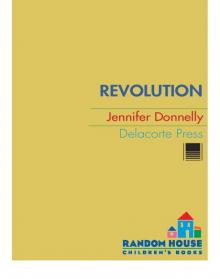 Revolution
Revolution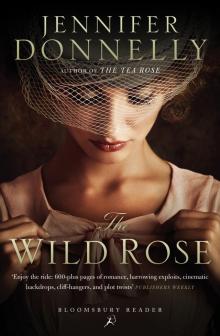 The Wild Rose
The Wild Rose Waterfire Saga (4 Book Series)
Waterfire Saga (4 Book Series)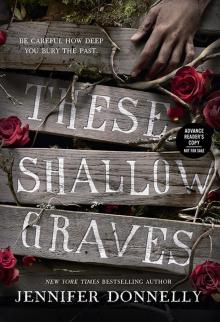 These Shallow Graves
These Shallow Graves Beauty and the Beast: Lost in a Book
Beauty and the Beast: Lost in a Book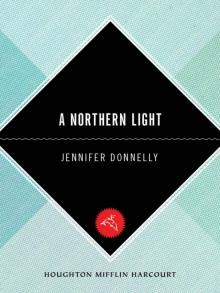 A Northern Light
A Northern Light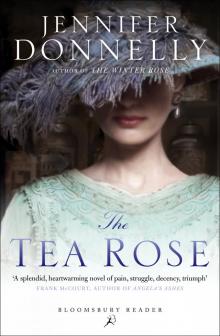 The Tea Rose
The Tea Rose Waterfire Saga, Book Three: Dark Tide: A Deep Blue Novel
Waterfire Saga, Book Three: Dark Tide: A Deep Blue Novel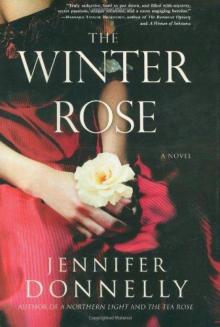 The Winter Rose
The Winter Rose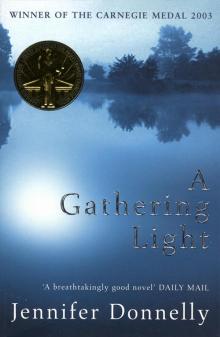 A Gathering Light
A Gathering Light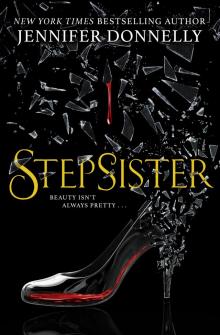 Stepsister
Stepsister Waterfire Saga, Book Four: Sea Spell: Deep Blue Novel, A
Waterfire Saga, Book Four: Sea Spell: Deep Blue Novel, A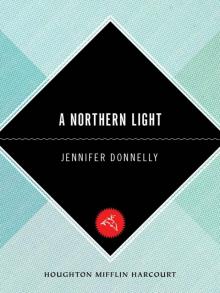 Northern Light
Northern Light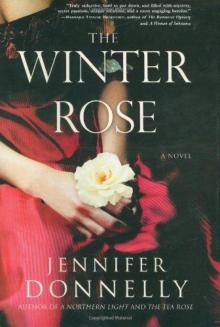 Winter Rose, The
Winter Rose, The